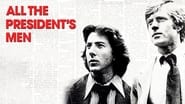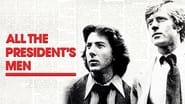Leofwine_draca
ALL THE PRESIDENT'S MEN is not only a stunning addition to the 1970s wave of conspiracy thrillers but also a great film dealing with the subject of journalism, up there with SPOTLIGHT as the best of its type. The story, which all true and about how two Washington Post reporters broke the Watergate scandal, is completely riveting, one of those suspense-fuelled movies that works despite not relying on generic action cliches or even an exciting score. The completely likeable Robert Redford and Dustin Hoffmann are perfectly cast as the intrepid reporters who refuse to take no for an answer, but the whole cast is spot on here. It's a film which just runs and runs and runs, ever complex yet easy to follow, that might just be one of the most important movies of the decade.
Calin Chiriac
"All the President's Men" (1976) follows the investigation led by Washington Post journalists Bob Woodward (Robert Redford) and Carl Bernstein (Dustin Hoffman) on the Watergate scandal, running parallel with President Nixon's campaign for reelection. As the two lead characters see their investigation unfold, hardly, must I say, they get banged down by your usual, but not quite so, "newspaper" drama : missing sources, pettiness of the story, abstinence and denial by the witnesses, lack of hard evidence and, above all, threat to the survival of the Post itself.This is a gripping time piece. Almost half of the story is spent at the newspaper's offices, overshadowed by the permanent key-tapping of ardent typewriters and the constant chatter of young secretaries, which add a great sense of urgency and authenticity to a typical 1970s Washington workplace, where Woodward and Bernstein, sitting face-to-face in an odd, diagonal line that becomes a subtle symbol for a head-butting professional relationship, learn to first tolerate each other (and each other's egos) before uniting to unveil the truth. The interactions between Hoffman and Redford throughout the movie are as delightful to watch as they are crucial to making William Goldman's Academy Award-winning script reach its climax. We, as spectators, pay attention to these two very powerful actors' every word with such care and eagerness without even seeing through their banter and mistakes, breathing sighs of relief when catching a loose second and setting the alarm as the next one arrives. In the meantime, we get glimpses of written notes swinging in every direction from Woodward, mainly, creating a true journalistic feel, and enthralling conversations over the phone from both characters, desperately attempting to connect with not only the people behind the scandal, but also with the obscure situation on which they vainly light their lamps on, to a point where the phone becomes a mere extension of the hand and the absence of voice on the other end of the wire provokes an expression of total indifference. The story hides behind this progressive and discreet line of events without ever declaring "right" or "wrong", and plays with the writers' heads, leading them to frustration, unaided by the pressure of their superiors, the Metro News' supervisor Harry Rosenfeld (Jack Warden) and the Post's Ben Bradlee (Jason Robards, in a sublime performance).The remainder of the movie explores Woodward and Bernstein's (or "Woodstein", as Bradlee once cries out, interrupting the high-pitched noise of the office for more than two seconds) attempts to force the truth (or, at least, parcels of it) out of various mouths (White House bookkeepers, attorneys, lawmen, you name it) and shows with true excitement the abusive paraphrasing and deduction the two men make with a less-than-minimal amount of words or simple nods from the speakers (or non-speakers). In fact, the two are so convinced of the story's credibility that they unequivocally trade sentences for common sense, really. This is where the movie falters; its will and urgency to depict these moments rapidly makes them seem trivial and forgettable. For instance, an "informant" of Woodward's ("Deep Throat", as they call him) only agrees to meet with him in a dark, underground parking, but the movie never truly gives his character the proper gravitas and importance that his name really bears, historically speaking.Nevertheless, "All the President's Men" is the prototype of a solid and honest depiction of a historical event or, in this case, a more or less extended period of time marked by historical events. Alan J. Pakula's camera is turning around America's capital with remarkable ease, giving us the feeling that we have already been there, with Woodward and Bernstein, and capturing the charm of residential homes, the cacophony of midnight streets and the peacefulness of everyday places, such as libraries and diners. As already mentioned, the dynamics of the characters and of their relationships elevate the movie way above average, but the thoroughness to get the story "just the right way" makes it even greater. At some points during the movie, we are projected with real-time speeches from Nixon and his entourage or with journalistic coverage from 1972 and 1973 on a small television set in the office, further down the road from Woodward's small cabinet. As we exchange glances from the coverage on TV to Woodward's continuous typing, we take a step back and contemplate the successful effort of converting the broadcasted story into a much more intimate one.
Asif Khan (asifahsankhan)
"All the President's Men" may be more historically inaccurate than accurate but it sure details a depth of political corruption at the time seemed unfathomable. Doesn't mean one can actually do less these days though, but when people seem to be genuinely pleased that newspapers are indeed dying, what they are essentially saying is that one of major tools to monitor the proper workings of government is no longer necessary. Thus, corruption can continue unchecked, democracy eroded even further.When I first watched this film, that's over 20 years after it's release. I had no idea about any of the details of Watergate whatsoever. I mean, I was a mare child in some classy school in London.Over 30 years before that was, Richard Nixon, impeached for spying on and sabotaging his political rivals and it all came to light because a handful of burglars got caught breaking into National Democratic Headquarters, which were located in an apartment complex known as "Watergate". The story was revealed due to a couple of reporters at the Washington Post, Woodward and Bernstein. That's it, that's all I knew. I didn't even know Woodward and Bernstein's first names. Just the bare minimum (I mean, I think ANY American should know that much, no? But I'm 150% English. With added 50% of USA and rising? that's 200% from both worlds).Here's the thing though. It doesn't matter that you don't know who Bob Haldeman was, you'll figure out enough of what's going on via context, and then the rest of the movie will work its magic on you. By the time the credits roll you'll be saying, that was so awesome, even though you still couldn't tell me what John Ehrlichmans title was at the White House. I've explained the level of complexity in the story as way of illustrating all the challenges this movie overcomes. What winds up happening isn't that the complexity overwhelms the viewer the viewer picks up on the necessary elements and enjoys the movie, while the Watergate-knowledgeable viewer winds up having a film full of details and minutiae to cherish.How do they do it? By focusing on the excitement of it. The adventure. All the President's Men is a thriller, people!! This is the greatest detective story of all time. Woodward and Bernstein were on a quest for the truth, and the truth was being protected by the most powerful people on the planet, with the full force of the government behind them!Woodward and Bernstein slowly come together as a team, and then slowly come to realise exactly what they're dealing with. Their suspicion grows. Evidence mounts.But as the story builds, so does the pressure. The stakes. Other newspapers are racing them to find the truth and to break the story first. People are trying to discredit them. At one point, their editor, Ben Bradlee (portrayed by Jason Robards, who won an Academy Award for this role) tell them, Were under a lot of pressure, you know, and you put us there. Nothings riding on this except the, uh, first amendment to the Constitution, freedom of the press, and maybe the future of the country. Not that any of that matters, but if you guys f*ck up again, Im going to get mad. Goodnight.He wasn't exaggerating, either. Had the Nixon Whitehouse succeeded in blocking their investigation and remained in power, who knows what the consequences would have been for the press. It certainly wouldn't have boded well for the Washington Post, as Nixon most assuredly would have done everything in his power to bring them down."All the President's Men" is truer to the craft of journalism than to the art of storytelling, and that's its problem. The movie is as accurate about the processes used by investigative reporters as we have any right to expect, and yet process finally overwhelms narrative -- we're adrift in a sea of names, dates, telephone numbers, coincidences, lucky breaks, false leads, dogged footwork, denials, evasions, and sometimes even the truth. Just such thousands of details led up to Watergate and the Nixon resignation, yes, but the movie's more about the details than about their results.That's not to say the movie isn't good at accomplishing what it sets out to do. It provides the most observant study of working journalists we're ever likely to see in a feature film (Bob Woodward and Carl Bernstein may at last, merciful God, replace Hildy Johnson and Walter Burns as career models). And it succeeds brilliantly in suggesting the mixture of exhilaration, paranoia, self-doubt, and courage that permeated the Washington Post as its two young reporters went after a presidency.Newspaper movies always used to play up the excitement and ignore the boredom and the waiting. This one is all about the boredom and the waiting and the tireless digging; it depends on what we already know about Watergate to provide a level of excitement. And yet, given the fact that William Goldman's screenplay is almost all dialogue, almost exclusively a series of scenes of people talking (or not talking) to each other, director Alan J. Pakula has done a remarkable job of keeping the pace taut. Does History still repeats itself?
Hitchcoc
The work of Redford and Hoffmann is impeccable here as are the supporting players. This, of course, is the story of the Washington Post investigation of the Watergate conspirators under the Nixon administration, specifically that of Bob Woodward and Carl Bernstein . It shows what happens when tips come in and the close scrutiny and support for sources that skilled journalists must adhere to. Because it was recent history, the players needed to be presented in a truly realistic way. We are introduced to Ben Bradlee, played by the wonderful Jason Robards, and all the principles involved. Hal Holbrook is the notorious "Deepthroat." There is a frantic pace to this as deadlines need to be met and the realities of the risks taken by the Post. Read a couple books on Watergate and then watch this. It is a gem.








